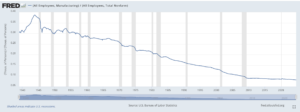Mr. Freddie deBoer
Mr. DeBoer:
You brought admirable soundness of mind to the debate over covid restrictions. I wonder, therefore, why that soundness abandoned you in your recent broadside against ‘neoliberalism.’ In your October 7th essay “They Still Won’t Say That They’re Sorry” you offer only self-righteous sermonizing amidst a mash-up of cherry-picked facts.
The foundational ‘fact’ on which your case against ‘neoliberalism’ rests is the allegation that “NAFTA and similar free trade agreements” caused America to deindustrialize. The evidence, however, that you offer to support this allegation fails. The fact that rates of fentanyl addiction, crime, and disability-payments are high in some American communities is indeed tragic, but these facts do not imply what you take them to imply – namely, that America has deindustrialized. Nor is deindustrialization implied by the data that you present showing that the absolute number of Americans working in manufacturing peaked in 1979.
Had you looked for direct evidence of American deindustrialization you wouldn’t have found it. The reason is that there has been no deindustrialization. America’s industrial capacity is today at an all-time high and 63 percent larger than it was when NAFTA first took effect in January 1994. And this capacity is being used: industrial output hit its all-time peak in September 2018 and is today only 0.9 percent off of that high. Note, by the way, that mid-2018 is when Trump’s tariffs were kicking into full effect; a case can be made that the slight decline in industrial output since then is a result of this retreat from free trade – that is, a result of a retreat from a policy that you assume, without sound evidence, to promote deindustrialization.
As for manufacturing employment, the relevant measure is not, contrary to your assumption, the absolute number of workers in manufacturing; rather, it’s the percentage of workers employed in manufacturing. Had you looked at the trend in this latter figure (shown here) you’d have discovered that the percentage of workers employed in manufacturing peaked in 1944 and has been steadily declining ever since, with no evident acceleration in this decline when NAFTA arrived, when China joined the WTO (in 2001), or when America began to run its still-unbroken string of annual trade deficits (in 1976).
of workers employed in manufacturing. Had you looked at the trend in this latter figure (shown here) you’d have discovered that the percentage of workers employed in manufacturing peaked in 1944 and has been steadily declining ever since, with no evident acceleration in this decline when NAFTA arrived, when China joined the WTO (in 2001), or when America began to run its still-unbroken string of annual trade deficits (in 1976).
Although tragic, the rise in fentanyl addiction, crime rates, “deaths of despair,” and many other problems in America cannot possibly have been caused by something – namely, deindustrialization – that never happened. And nor can, as you call it, “unfettered free trade” be blamed for this nonoccurrence.
Sincerely,
Donald J. Boudreaux
Professor of Economics
and
Martha and Nelson Getchell Chair for the Study of Free Market Capitalism at the Mercatus Center
George Mason University
Fairfax, VA 22030



